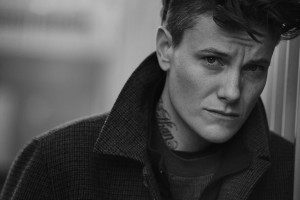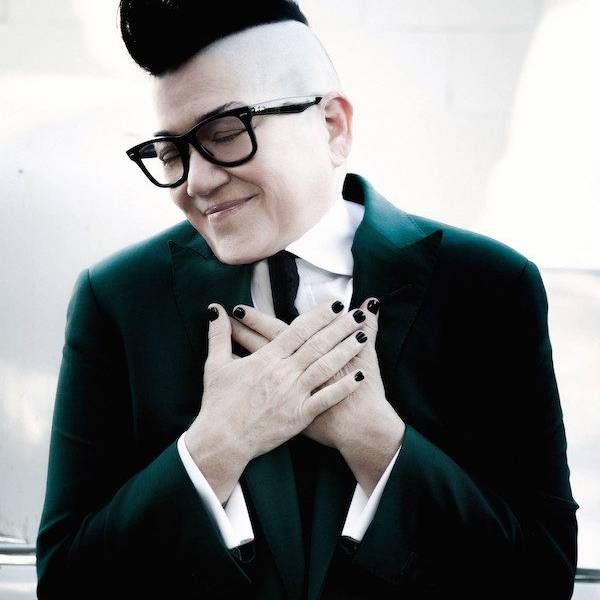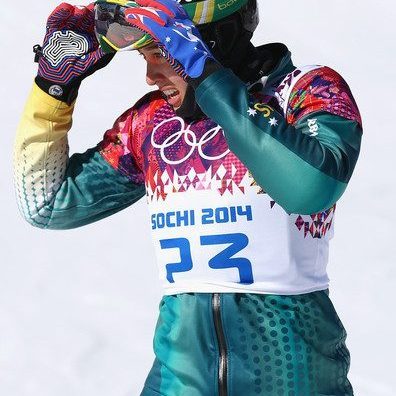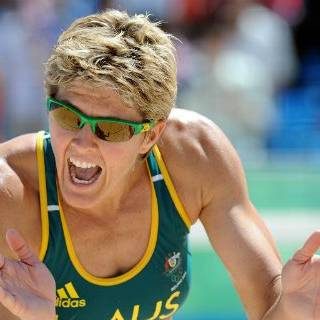
In a new memoir, former Olympic swimmer Casey Legler, reveals the experiences that defined her during a harrowing adolescence.
For a long time after she retired, Casey Legler didn’t swim. She stayed far away from the water. The former Olympic swimmer’s youth was so deeply immersed in a pool of addiction, anguish, and assault that she was almost drowned by the weight of it all. But five years ago, while she was in Sydney, Australia, with her wife, Siri May—United Nations Program Coordinator for Outright International—Legler dared to dive into the Andrew “Boy” Charlton Pool in Sydney Harbor.
And it felt good.“
I’ve been in the best pools in the world and it’s the best pool in the world,” she says over the phone from her home in New York City, her voice dripping wet with excitement at the thought of it. “It was a saltwater pool, outdoors, by this beautiful botanical garden. It’s also the same place that I finished my book.”
Legler, now 41, is sober and delightful. These days she spends her time managing French restaurant La Mercerie in Soho, modelling male clothes for Ford Models, and immersing herself in her writing. Her magazine work has been featured in Vogue, Time, and Le Monde, and her first book, Godspeed, was just released through Simon and Schuster. It’s a blunt and extremely honest memoir about Legler’s harrowing ride through adolescence, where she endured sexual assault, a tug-and-pull battle with addiction, and the pressures of being a young and talented athlete.
From the very first page of the book, Legler tethers you to a boat with no sail and lets you drift farther into dangerous waters without a compass or any sense of how you’re going to get back to shore. As the captain, she is a willing guide, but that’s it. You’re in this journey with her, no matter where it goes or how it might end. There are white-knuckle moments, sentences so rich with sounds and sights that they jump right off the page, and times when Legler seems as much a struggling character as she does the orchestrator of her own destruction. “
The way that I wrote the book was intentional,” Legler admits. “The first draft that I gave my agent was a multidiscipline 85-page experience complete with photographs and different types of language—from poetry to succinct phrases and short stories—to try to embody the experience that was my childhood. What I had essentially created was an art project. I had a few copies made and gave them to some close friends. And then we just started working on the actual story that I was really excited to tell, though I knew that in order for it to be interesting to a wider audience, I had to change the way I wrote it.”
Most of Godspeed takes place in France, where Legler spent the bulk of her childhood.
She intersperses some of her memories with French phrases and words—something she says she’s done because her mind recalls them that way. “
A lot of my memories are in French, but I write in English. So, I had to figure out what that was going to look like on the page, and then bring the reader along on this journey that is not an easy one and that at times is abhorrently violent. My life today is so full of joy and peace, so it was about making a book that tells a story that folks will want to read and understand, and then come away from maybe even feeling inspired.”
Legler started drinking alcohol at 12 years old. She used it as a remedy for many things—boredom, stress, inadequacy, confusion, and even as a release from the stress of competitive swimming. As talented a swimmer as she was, Legler actually came to hate everything about swimming. It was a gift and a curse. At 19 years old, she competed for France in the 1996 Summer Olympics. Though she had broken a world record the day before, in practice, that night she went on a bender to escape the world around her. She failed to even come close to the podium.“
It took about seven years after I retired to be able to even talk about my swim career because I had such a deep sense of shame and failure for how I performed at the Olympics,” Legler confesses. “Swimming was so distressing for me, but some of the skill set I have as an adult, some of my best traits, I gained directly from swimming. I also think swimming saved my life. If I hadn’t had the obligation to go to practice every day, where everything was quiet, I’m not sure I would have made it past being a teenager.”
Before Legler sat down to write the manuscript for Godspeed, she had already made peace with her past.
Revisiting the intense trauma she suffered at the hands of her addiction wasn’t cathartic or even troublesome. It was necessary in order to tell an authentic story—a story that Legler felt she was in the right place and state of mind to share.“
I couldn’t have written it any sooner than I did. I’m 41, and this book stops when I’m 20. So, there’s a distance there that allows me to meet the inevitable challenges when someone is writing about that type of content. It wasn’t difficult to write but, yes, of course, some parts were painful to tell, simply because they are horrible. I think I chose some of the moments specifically for their poignancy. And they remain, even for me, difficult to read. This book was meant to happen in this particular era and that feels very special, to be able to show up in dignity and truth alongside all the other very brave people who are telling their stories right now [during the #MeToo movement].”
Another aspect of Legler’s past that she only recently became aware of is that she is autistic. Legler discovered she was on the autism spectrum shortly after she finished her memoir. The news she says was “the best thing,” because inadvertently she had revealed what it’s like to be in the mind of an autistic adolescent girl. It’s something she’s very excited to share, something that is “wild and magical and miraculous,” but at the same time explains so much about who she was, how she’s evolved, and where she is now.
At the end of Godspeed, readers who don’t know Legler as a kickass model and chef, an incredibly warm and genuine human being, and a vocal advocate of LGBTQ rights, are left to wonder what’s become of her. But she doesn’t need to write a sequel in order for you to find out. She’ll gladly share that with you now.“
I’m happily married. I’m laughing. I have real relationships with friends. I’ve fallen in love with the life that I get to have in restaurants. I feel lucky that I can show up, be present and say my name in art and fashion spaces, and be given the chance to write. And there isn’t a day that goes by that I am not grateful for or aware of the fact that I should be dead.”




